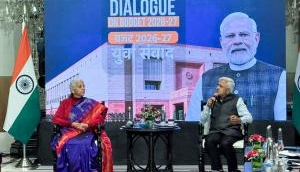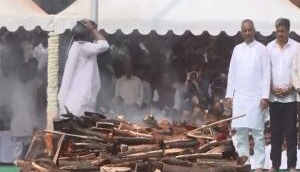
Annihilation of Caste, a searing critique of the Hindu caste system is one of the most important works of BR Ambedkar. Written to be delivered as a speech at a conference by Jat-Pat-Todak Mandal in 1936, the chairman of the drafting committee of the Constitution had to step back from the event. Why? Because his views on conversion, him announcing his exit from the fold of Hinduism at the end of the address and his criticism of Hindu scriptures were not acceptable to the organisers.
However, the unused draft of the speech, which sold thousands of copies and has been translated into several languages, continues to be an important document on the evils of the caste system in India and the manner in which it has impacted India's development as a polity and economy.
As we observe BR Ambedkar's 125th birth anniversary, it is important to go back to his original text, his original thoughts as summed up in Annihilation of Caste, sans any selective interpretation of what he stood for.
On "Hindu society":
The first and foremost thing that must be recognized is that Hindu Society is a myth. The name Hindu is itself a foreign name. It was given by the Mohammedans to the natives for the purpose of distinguishing themselves [from them]. It does not occur in any Sanskrit work prior to the Mohammedan invasion. They did not feel the necessity of a common name, because they had no conception of their having constituted a community. Hindu Society as such does not exist. It is only a collection of castes. Each caste is conscious of its existence. Its survival is the be-all and end-all of its existence.
On forceful religious conversion vs caste discrimination
"The Hindus criticise the Mohammedans for having spread their religion by the use of the sword. They also ridicule Christianity on the score of the Inquisition. But really speaking, who is better and more worthy of our respect - the Mohammedans and Christians who attempted to thrust down the throats of unwilling persons what they regarded as necessary for their salvation, or the Hindu who would not spread the light, who would endeavour to keep others in darkness, who would not consent to share his intellectual and social inheritance with those who are ready and willing to make it a part of their own make-up? I have no hesitation in saying that if the Mohammedan has been cruel, the Hindu has been mean; and meanness is worse than cruelty."
On shuddhi (purification)
"It is the caste which has prevented the Hindus from expanding and from absorbing other religious communities. So long as Caste remains, Hindu religion cannot be made a missionary religion, and Shudhi will be both a folly and a futility."
On intermarriage being the way to end caste system:
"I am convinced that the real remedy is intermarriage. Fusion of blood can alone create the feeling of being kith and kin, and unless this feeling of kinship, becomes paramount, the separatist feeling - the feeling of being aliens -created by Caste will not vanish."
Frontal attack on Hindus Shastras
"Hindus observe Caste not because they are inhuman or wrong-headed. They observe Caste because they are deeply religious. People are not wrong in observing Caste. In my view, what is wrong is their religion, which has inculcated this notion of Caste. If this is correct, then obviously the enemy you must grapple with is not the people who observe Caste, but the Shastras which teach them this religion of Caste. Criticising and ridiculing people for not interdining or inter-marrying, or occasionally holding inter-caste dinners and celebrating inter-caste marriages, is a futile method of achieving the desired end. The real remedy is to destroy the belief in the sanctity of the Shastras."
First published: 12 April 2016, 7:39 IST






![BJP's Kapil Mishra recreates Shankar Mahadevan’s ‘Breathless’ song to highlight Delhi pollution [WATCH] BJP's Kapil Mishra recreates Shankar Mahadevan’s ‘Breathless’ song to highlight Delhi pollution [WATCH]](https://images.catchnews.com/upload/2022/11/03/kapil-mishra_240884_300x172.png)

![Anupam Kher shares pictures of his toned body on 67th birthday [MUST SEE] Anupam Kher shares pictures of his toned body on 67th birthday [MUST SEE]](https://images.catchnews.com/upload/2022/03/07/Anupam_kher_231145_300x172.jpg)






